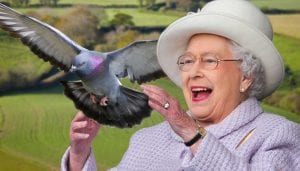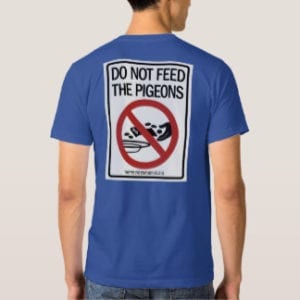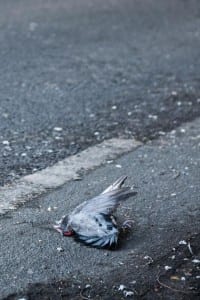
by Pigeon Patrol | Jul 26, 2016 | Bird Deterrent Products, Bird Netting, Pigeon Patrol's Services
 Animal welfare officers who rescued a lost pigeon in East Lothian were in for a surprise when they discovered in belonged to the Queen.
Animal welfare officers who rescued a lost pigeon in East Lothian were in for a surprise when they discovered in belonged to the Queen.
The Scottish SPCA was called when the exhausted bird was spotted at Traprain Terrace in Haddington on February 2.
Staff traced it back to its owner and the racing pigeon has now been returned to the royal loft on the Sandringham estate in Norfolk.
The bird was identified by a ring number on its leg.
Connie O’Neill, Scottish SPCA animal rescue officer , said: “I’ve rescued many pigeons during my career with the Scottish SPCA but this was certainly a first for me.
“I was really excited when I found out it was one of the Queen’s racing pigeons.
“We were able to identity where the pigeon had come from using the ring number on its leg and arrangements were made for it to be collected.
“The poor bird was exhausted and it was a cold, dark and windy night when it was found. Thankfully someone contacted us as it would have been very easy prey for a cat.
“It’s quite common for racing pigeons to lose their way and become too tired to take off again. I’m really glad we were able to help in this instance.”
About Pigeon Patrol:
Pigeon Patrol Products & Services is the leading manufacturer and distributor of bird deterrent (control) products in Canada. Pigeon Patrol products have solved pest bird problems in industrial, commercial, and residential settings since 2000, by using safe and humane bird deterrents with only bird and animal friendly solutions. At Pigeon Patrol, we manufacture and offer a variety of bird deterrents, ranging from Ultra-flex Bird Spikes with UV protection, Bird Netting, 4-S Gel and the best Ultrasonic and audible sound devices on the market today.
Voted Best Canadian wholesaler for Bird Deterrent products four years in a row.
Contact Info: 1- 877– 4– NO-BIRD (www.pigeonpatrol.ca)

by Pigeon Patrol | Jul 25, 2016 | Animal Deterrent Products, Pigeon Patrol's Services, Pigeons in the News
 People offering grains to feral Common Pigeons (Columba livia) at designated kabutarkhanas or illegitimate feeding places are a common sight these days. It may seem to be a noble deed and is also perceived to be so by many. Hundreds of pigeon-lovers are seen flocking around the grain sellers to purchase the grains to be fed to the pigeons. Mostly such feeding stations are adjacent to places of worship. There are many people who have created mini feeding stations in the balconies, on the window ledges or terraces.
People offering grains to feral Common Pigeons (Columba livia) at designated kabutarkhanas or illegitimate feeding places are a common sight these days. It may seem to be a noble deed and is also perceived to be so by many. Hundreds of pigeon-lovers are seen flocking around the grain sellers to purchase the grains to be fed to the pigeons. Mostly such feeding stations are adjacent to places of worship. There are many people who have created mini feeding stations in the balconies, on the window ledges or terraces.
A large number of people feed pigeons for religious reasons, thinking that by feeding pigeons they are helping the birds and perhaps this helps in washing away their sins. People also believe that feeding pigeons brings prosperity to those who feed them. There are others who feed pigeons thinking that pigeons are hungry, need food and would not survive unless fed by them. Grains are purchased and literally scattered in heaps for the pigeons to feed. Such artificial feeding has led to overpopulation of pigeons that is much beyond the carrying capacity of any place.
AT A GLANCE
The global population estimation of Common Pigeons is c.26,00,00,000 (as per BirdLife International and IUCN).
In one of the citizen science programmes launched to monitor common bird species of India, Common Pigeon topped the list with House Crow following at number two.
It is quite obvious that pigeons are doing very well in cities like Mumbai, thanks to the compassion of many citizens.
Do you wonder what keeps the populations of bird species in the wild balanced, be it a pigeon or an eagle? Food chain, to a great extent, regulates relative abundance of each species based on their reproduction, deaths and predator-prey relationship. In case of feral pigeons, in cities like Mumbai, there is a problem of plenty. In the wild, the Common Pigeon (previously known as the Blue Rock Pigeon) is seen around cliffs and rocky areas, which they prefer for nesting. However, in cities and towns their preference for naturally occurring cliffs has been replaced by parapets, AC compressor units and any such flat surface in city buildings where pigeons seek shelter. Due to the constant availability of food, pigeons have started nesting throughout the year; unlike in the wild where nesting season coincides with the food availability in nature. Predatory birds help in keeping the population of pigeons in control by feeding on them in the wild. But unfortunately urbanisation has practically wiped out the predatory birds from most city limits.
Had it been not for our compassionate feeding, the pigeons would have survived anyway but in lesser numbers, enough to be sustained on the natural food availability in and around the cities. By providing them with ready food, pigeons in cities have lost their natural ability to scavenge and survive on their own. Scavenging for food is an important exercise for wild birds that they must indulge in. Such ‘compassionate’ feeding may attract birds (and also rodents like rats and mice) close to you but may also result in nutritional deficiencies in birds. Let the birds decide what they wish to feed on instead of us deciding what they should feed on!
The population explosion of pigeons in cities and towns is a serious trend that is slated to grow in future as there is no dearth of food offered to them and nesting sites in cities. Lots of pigeons around may make some people happy but doctors and veterinarians have often expressed concerns over this issue and advise refraining from feeding pigeons.
Dr Alice Bacon at Fraser and Fraser Vets Ltd, Dingwall, Scotland.
Many people enjoy feeding and watching wild birds, but are unaware that their actions may inadvertently cause more harm than good; supplementary feeding supports unnaturally large pigeon populations, and this over-crowding can cause disease outbreaks in pigeons, other wild birds and humans.”
Keeping leftover food or other food stuff in the balcony for other species of ‘hungry’ birds should also be reassessed and probably discouraged. Veterinarians warn that such bird feeders may act as a nodal point of disease spread to other species of birds for emerging diseases of infectious nature.
Dr Olga Nicolas of Vallcalent Wildlife Rescue Centre in Spain.
It may have a zoonotic risk like Salmonella, Chlamydia, hemoparasites though hippoboscid flies etc.”
As the faecal matter gets dried up it forms fomites which could travel in air facilitating spread of infection. Symptoms of coughing, rhinitis, arthritis and headache could easily be encountered. People in the vicinity of pigeons and their droppings are at the highest risk of catching infection. Other species of birds are at great risk of mutually getting infected as well and it would make the infection to persist for longer. On the other hand, birds quickly get used to our food, which obviously is not their natural food. Also, birds not feeding naturally might affect the ecological food chain as they may not eat the fruit which only germinates when it passes through that bird’s intestine. Our ignorance in these matters can have serious consequences that we may not be even aware of. Then why should we interfere with their routine of scavenging for food? “The natural balance of wildlife populations is very sensitive, and we must be careful of how our interactions affect them”, says Dr Bacon.
Don’t get discouraged as a bird lover! You certainly have a role to play as there are many ways of helping in the conservation of birds. Misplaced compassion is not conservation and often does not help. Planting, nurturing and protecting plant species that provide shade, perches, nesting places, fruits and flowers for wild birds is a more sustainable and a logical way to help in bird conservation than artificially feeding wild birds. There are several other ways of getting involved in the conservation of birds. But of course, it requires you to move out of the comfort of your homes and venture out into the wilderness.
As long-term measures, getting involved in wildlife conservation agencies in personal capacity as volunteers, supporting the community at the fringe of protected areas and organising nature clubs and awareness trails on bird conservation for students, are options which you could consider to make an impact on overall bird conservation.
We sincerely appeal to the concerned authorities to take note of the potential health hazards and ecological ramifications associated with feral pigeons and take immediate steps to close down the kabutarkhanas and other pigeon feeding stations. The surplus population of feral pigeons will thus move out elsewhere in the quest for food. Use of some anti-fertility drug or some such means to control the population growth among the pigeons without harming them could also be an option to be considered in controlling the growing pigeon populations.
Dr Barbara Vogler from National Reference Centre for Poultry and Rabbit Diseases, University of Zurich, Switzerland.
The problem of city pigeons is well recognised in Switzerland since many years. Most people are aware that they should not feed pigeons and commonly only elderly people still do it and we do have population control programmes in Bern and Zurich.”
Anti-fertility drugs, if given orally as meals, would have to be assessed for their impact on other birds too as consumption by other bird species can’t be totally ruled out. Impact of such anti-fertility drugs would need to be assessed for any possible toxic effects down the food chain too. In the larger interest of pigeons and humans, people from all communities should come together to sensitively address this problem.
Kedar Gore is a biologist and wildlife conservationists by profession for over two decades. Dr. Naveen Pandey is veterinarian with an expertise and experience in rescue and treatment of wildlife species
About Pigeon Patrol:
Pigeon Patrol Products & Services is the leading manufacturer and distributor of bird deterrent (control) products in Canada. Pigeon Patrol products have solved pest bird problems in industrial, commercial, and residential settings since 2000, by using safe and humane bird deterrents with only bird and animal friendly solutions. At Pigeon Patrol, we manufacture and offer a variety of bird deterrents, ranging from Ultra-flex Bird Spikes with UV protection, Bird Netting, 4-S Gel and the best Ultrasonic and audible sound devices on the market today.
Voted Best Canadian wholesaler for Bird Deterrent products four years in a row.
Contact Info: 1- 877– 4– NO-BIRD (www.pigeonpatrol.ca)

by Pigeon Patrol | Jul 24, 2016 | Pigeon Patrol's Services, Pigeons in the News, UltraSonic Bird Control
 A New Jersey teenager hired to humanely kill birds after a Philadelphia Gun Club pigeon shoot is now facing animal cruelty charges — after the incident in Bensalem, Pa. was captured on video by an animal rights group.
A New Jersey teenager hired to humanely kill birds after a Philadelphia Gun Club pigeon shoot is now facing animal cruelty charges — after the incident in Bensalem, Pa. was captured on video by an animal rights group.
Steve Hindi of Showing Animals Respect and Kindness said one of the group’s investigators was filming the shoot from across the Delaware River as part of its ongoing effort to monitor the Philadelphia Gun Club’s activities.
The two organizations have been involved in litigation and are currently operating under a consent decree that required some concessions from the gun club — including that the gun club make someone available to quickly, humanely euthanize birds after shoots, Hindi said.
In the video, someone in a red hood is seen throwing rocks at the birds, and then flinging and kicking the birds themselves. He appears to be alone and unsupervised. He has been identified in news reports as being from Bridgeton, but police have not released his identity because of his age.
SHARK provided the video to police, but alleges the gun club didn’t cooperate — telling police the club didn’t have anyone in that area during the shoot and didn’t know the individual involved.
“All we can say now is that we can’t identify who the person is, and we’re cooperating with the police investigation,” attorney Sean Corr, representing the gun club, told Philly.com earlier this month. “It appears that he was down range during active shooting, and we don’t station anybody in front of the firing line. That just adds to the mystery.”
Hindi told New Jersey 101.5 his organization then provided police with further footage — showing the person in the red hood coming out of the gun club’s property and associating with its members.
“The Philadelphia Gun Club cooperated with the police and does not believe the individual would have been apprehended without our cooperation,” Corr is quoted telling Philly.com in a newer report. A call to Corr by New Jersey 101.5 has not yet been returned.
Hindi called that an “amazing turnaround.”
“They want credit for having put a kid out there by himself, a minor, torturing animals without supervision, after initially saying they don’t know who he is,” Hindi said.
In the Philly.com report, Bensalem Police Lt. William McVey said pigeon shoots are legal in Pennsylvania (though SHARK disputes that) — “so there’s nothing we can do about that. Our concern is the treatment of the animal once it is shot, to make sure it’s (euthanasia) done as humanely and swiftly as possible. In this case, it crossed the line.”
A call to Bensalem Police has not yet been returned.
About Pigeon Patrol:
Pigeon Patrol Products & Services is the leading manufacturer and distributor of bird deterrent (control) products in Canada. Pigeon Patrol products have solved pest bird problems in industrial, commercial, and residential settings since 2000, by using safe and humane bird deterrents with only bird and animal friendly solutions. At Pigeon Patrol, we manufacture and offer a variety of bird deterrents, ranging from Ultra-flex Bird Spikes with UV protection, Bird Netting, 4-S Gel and the best Ultrasonic and audible sound devices on the market today.
Voted Best Canadian wholesaler for Bird Deterrent products four years in a row.
Contact Info: 1- 877– 4– NO-BIRD (www.pigeonpatrol.ca)

by Pigeon Patrol | Jul 23, 2016 | 4-S Gel Bird repellent, Bird Deterrent Products, Pigeons in the News
 Apparently, it’s completely legal to gun down live birds released from boxes at the Philadelphia Gun Club, but hiring this teenager to end the lives of birds that were missed is downright cruel. What activists from SHARK seem to be forgetting, is that regardless of this kid’s actions, those birds were set to die.
Apparently, it’s completely legal to gun down live birds released from boxes at the Philadelphia Gun Club, but hiring this teenager to end the lives of birds that were missed is downright cruel. What activists from SHARK seem to be forgetting, is that regardless of this kid’s actions, those birds were set to die.
When the group filmed the kid chasing down the birds and using beach side objects like sticks and rocks to kill them, they brought focus to the treatment of animals instead of the use. “The shoots are legal in Pennsylvania, so there’s nothing we can do about that. Our concern is the treatment of the animal once it is shot, to make sure it’s (euthanasia) done as humanely and swiftly as possible,” Police Lt. William McVey told the news outlet. “In this case, it crossed the line.” The argument here is that death is fine, as long as it’s swift. But why isn’t the argument that we shouldn’t be killing these pigeons at all?
God dammit – those birds were property of the hunting club, and people expect them to be taken care of! An attorney for SHARK said, ”It shows that whatever steps the gun club has taken up until now to keep its promise have been inadequate, so the Bensalem Police Department’s decision to file charges doesn’t satisfy SHARK’s concern that future shoots held at the gun club also won’t comply with the agreement. Right now, SHARK is exploring their options in pursuing an appropriate remedy, including returning to court.” How can we ever trust these hunters again?
Really, attorneys should be working on getting rid of the entire club, their hosting of these semiannual shoots, and the unnecessary use of these pigeons for sport. And when it comes to educating a seventeen year old on animal rights, we ought the talk veganism and not “nice” ways to put an animal down.
About Pigeon Patrol:
Pigeon Patrol Products & Services is the leading manufacturer and distributor of bird deterrent (control) products in Canada. Pigeon Patrol products have solved pest bird problems in industrial, commercial, and residential settings since 2000, by using safe and humane bird deterrents with only bird and animal friendly solutions. At Pigeon Patrol, we manufacture and offer a variety of bird deterrents, ranging from Ultra-flex Bird Spikes with UV protection, Bird Netting, 4-S Gel and the best Ultrasonic and audible sound devices on the market today.
Voted Best Canadian wholesaler for Bird Deterrent products four years in a row.
Contact Info: 1- 877– 4– NO-BIRD (www.pigeonpatrol.ca)

by Pigeon Patrol | Jul 22, 2016 | Animal Deterrent Products, Pigeon Patrol's Services, Pigeons in the News
 The St Regis Saadiyat has employed new staff in the battle against unsightly pigeon droppings – a full-time falconer and his birds.
The St Regis Saadiyat has employed new staff in the battle against unsightly pigeon droppings – a full-time falconer and his birds.
Alex Louw flies his specially trained falcons on weekdays to ensure that about 300 pigeons that took residence at the five-star St Regis since it opened start looking for other, more hospitable dwellings.
To achieve this, the South African falconer flies his eight peregrine falcons, the natural prey of which are smaller birds.
“They don’t kill anything but I let the birds fly for hours a day, and over months they now see the hotel as their territory. Their presence alone deters the pigeons from being here,” Mr Louw said.
He will randomly select the birds on any given day so that the pigeons, which are quite smart birds, never feel like they have quite outsmarted the falcons.
The technique has achieved great results.
Marwan Fadel, a sales director at the St Regis, said within just a few months the island hotel went from 300 resident pigeons to fewer than 20 – results conventional methods failed to achieve.
“Since day one we’ve had a lot of pigeons and that means you’re dealing with a mess,” Mr Fadel said. “We tried lots of tools, such as spikes, and they weren’t working.”
Aside from creating an almost prison-like look, spikes on ridges, the most common deterrent for birds, simply do not work as pigeons will eventually find ways to build nests in between the points, and sometimes on top of them.
Gels, the other method, are environmental hazards that could be harmful to endangered animals’ ecosystem on the protected Saadiyat Island.
So they approached Mr Louw and told him of the problem. He began training birds, and tried out a dozen from his roster of 38 before he found the right ones.
“We couldn’t have them hunt the actual pigeons, despite it being the birds’ instinct we thought it wouldn’t be great if pigeons were being eaten by falcons in a family setting,” he said.
Mr Louw has been using falcons for bird control for 25 of his 40 years in falconry.
“It’s a very old idea. I used to do this 25 years ago in South Africa for the military,” he said. “They had problems with birds on the runways getting in engines of planes, and so we started a falconry project there and we saved them US$2 million (Dh7.34m) in the first year just in bird strikes.”
Mr Louw is passionate about falconry and gives guests at the hotel an introduction.
“After flying one of my birds, it sometimes takes me an hour to walk from the beach to my car because I get stopped so much,” he said. “And I love it. I carry extra gloves so that the kids, anyone really, can hold the falcons.”
Mr Louw has become a hotel attraction, and regular mention of him and his birds on Trip Advisor has been common among the hotel’s almost 2,000 reviews.
“It’s become a hotel attraction,” said Mr Fadel. “I think we’re really on to something.”
About Pigeon Patrol:
Pigeon Patrol Products & Services is the leading manufacturer and distributor of bird deterrent (control) products in Canada. Pigeon Patrol products have solved pest bird problems in industrial, commercial, and residential settings since 2000, by using safe and humane bird deterrents with only bird and animal friendly solutions. At Pigeon Patrol, we manufacture and offer a variety of bird deterrents, ranging from Ultra-flex Bird Spikes with UV protection, Bird Netting, 4-S Gel and the best Ultrasonic and audible sound devices on the market today.
Voted Best Canadian wholesaler for Bird Deterrent products four years in a row.
Contact Info: 1- 877– 4– NO-BIRD (www.pigeonpatrol.ca)

 Animal welfare officers who rescued a lost pigeon in East Lothian were in for a surprise when they discovered in belonged to the Queen.
Animal welfare officers who rescued a lost pigeon in East Lothian were in for a surprise when they discovered in belonged to the Queen.

 People offering grains to feral Common Pigeons (Columba livia) at designated kabutarkhanas or illegitimate feeding places are a common sight these days. It may seem to be a noble deed and is also perceived to be so by many. Hundreds of pigeon-lovers are seen flocking around the grain sellers to purchase the grains to be fed to the pigeons. Mostly such feeding stations are adjacent to places of worship. There are many people who have created mini feeding stations in the balconies, on the window ledges or terraces.
People offering grains to feral Common Pigeons (Columba livia) at designated kabutarkhanas or illegitimate feeding places are a common sight these days. It may seem to be a noble deed and is also perceived to be so by many. Hundreds of pigeon-lovers are seen flocking around the grain sellers to purchase the grains to be fed to the pigeons. Mostly such feeding stations are adjacent to places of worship. There are many people who have created mini feeding stations in the balconies, on the window ledges or terraces.
 A New Jersey teenager hired to humanely kill birds after a Philadelphia Gun Club pigeon shoot is now facing animal cruelty charges — after the incident in Bensalem, Pa. was captured on video by an animal rights group.
A New Jersey teenager hired to humanely kill birds after a Philadelphia Gun Club pigeon shoot is now facing animal cruelty charges — after the incident in Bensalem, Pa. was captured on video by an animal rights group.
 Apparently, it’s completely legal to gun down live birds released from boxes at the Philadelphia Gun Club, but hiring this teenager to end the lives of birds that were missed is downright cruel. What activists from SHARK seem to be forgetting, is that regardless of this kid’s actions, those birds were set to die.
Apparently, it’s completely legal to gun down live birds released from boxes at the Philadelphia Gun Club, but hiring this teenager to end the lives of birds that were missed is downright cruel. What activists from SHARK seem to be forgetting, is that regardless of this kid’s actions, those birds were set to die.
 The St Regis Saadiyat has employed new staff in the battle against unsightly pigeon droppings – a full-time falconer and his birds.
The St Regis Saadiyat has employed new staff in the battle against unsightly pigeon droppings – a full-time falconer and his birds.